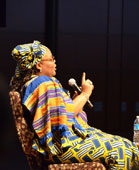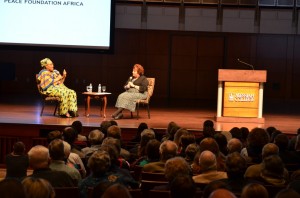Nobel Peace Laureate Leymah Gbowee models courage and conviction
 Few were more suited to conclude Messiah’s yearlong lecture series, “Courage and Conviction for Challenging Times” than Leymah Gbowee, a woman whose personal courage, conviction and commitment to community-building played a pivotal role in ending Liberia’s civil war and in enabling Liberian women to become educated, empowered agents of peace and reconciliation.
Few were more suited to conclude Messiah’s yearlong lecture series, “Courage and Conviction for Challenging Times” than Leymah Gbowee, a woman whose personal courage, conviction and commitment to community-building played a pivotal role in ending Liberia’s civil war and in enabling Liberian women to become educated, empowered agents of peace and reconciliation.
A late winter snow storm was forgotten in Parmer Hall on March 18 as more than 400 students, educators and community members listened to Gbowee recall moments of courage and conviction in her life. Critical of the bystander culture that she views as pervasive in society today, Gbowee challenged, “The world awaits all of us to step out, to do something. The world awaits all of us to leave large prints. And God is on hand to strength all of us.”
Gbowee shared specific moments when she was convicted to respond to injustice. She recalled witnessing a teenage boy verbally abusing a middle-school-aged girl. She not only confronted the young man—a stranger to her—for his inappropriate behavior, but she also reprimanded the cluster of young girls who stood quietly by while their friend was harassed. “Sisterhood is for real; you just to have find real sisters,” Gbowee told the young girls.
Gbowee also recounted an instance of going toe-to-toe with a heavily armed Liberian war lord. He backed down; she did not. “Cowards get their strength from the weapons they carry,” she said. “Conviction and cowardly behavior are not companions.”
Gbowee’s leadership of the Women of Liberia Mass Mass Action for Peace—which brought together Christian and Muslim women in a nonviolent movement—played a pivotal role in ending Liberia’s civil war in 2003. Ellen Johnson Sirleaf, president of Liberia, says, “Leymah bore witness to the worst of humanity and helped bring Liberia out of the dark.” In 2011 Gbowee, Sirleaf and Tawakkol Karman were honored as Nobel Peace Laureates for their advocacy for African women’s rights and peace-building work.
 “Conviction opened a doorway for courage,” Gbowee recalled about the efforts of the Mass Action for Peace. Five women initially felt convicted to action. Soon the effort was 10,000 women strong. The boldness of these women to confront and forgive the soldiers who had raided their villages, pillaged their homes and raped them and their children is barely comprehensible.
“Conviction opened a doorway for courage,” Gbowee recalled about the efforts of the Mass Action for Peace. Five women initially felt convicted to action. Soon the effort was 10,000 women strong. The boldness of these women to confront and forgive the soldiers who had raided their villages, pillaged their homes and raped them and their children is barely comprehensible.
Being bold in action and spirit, Gbowee is certain that courage and conviction are best paired with community. “I’m convicted; I have the courage, but I need companions,” she explained. “I am where I am because of who we all are,” she said of the importance of community.
Though she received the Nobel Peace Prize at the young age of 39 and seemingly could rest now on her past accomplishments, Gbowee said she is “too hyped up” to retire now. There are still girls who need access to education, who need rescued from prostitution and who need empowered to stand boldly against injustice in their communities. Gbowee is facilitating this type of work through her Gbowee Peace Foundation, an organization with efforts in West Africa and the United States.
As someone who has experienced God’s compassion in her own life, Gbowee is compelled to ensure her foundation can continue to “empower to inspire.” Recalling the need for companions in order to courageously follow convictions, Gbowee asked, “What impact can Messiah College have in this community?” Then she challenged, “Speak out, stand up and do something.”
Photos by Megan Dobinson `16.




